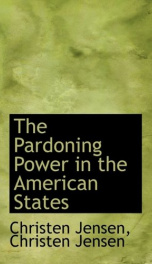the pardoning power in the american states

Purchase of this book includes free trial access to www.million-books.com where you can read more than a million books for free. This is an OCR edition with typos. Excerpt from book: CHAPTER IV ADMINISTRATION AND OPERATION OF PARDON AUTHORITIESContinued Having concluded a study of the requirements preliminary to the holding of a clemency hearing attention may next be directed to the manner in which hearings are conducted in the various states. OPEN OR CLOSED HEARINGS I Whether a hearing shall be an open one or a closed one is a matter on which practice is not uniform. Open hearings are held in Alabama, Connecticut, Georgia, Idaho, Illinois, Indiana, Maine, Maryland, Michigan, Missouri, Montana, Nebraska, New Hampshire, New Mexico, , f North Carolina, Pennsylvania, South Dakota, Utah, Vermont, Virginia, and Wisconsin. On the other hand closed hearings are held in Arkansas, , California, North Dakota, Oregon, and Wyoming. In Colorado the hearings are regarded as open but only interested parties may appear, the press and the curious public being excluded. The rules of the Iowa Board of Parole, which is also an advisory pardon board, provide for an open hearing but the chairman of the Board reports that they are closed. Massachusetts holds closed hearings except when the Board considers that the petitioner or the public may be benefited by an open session. In Ohio informal hearings are held. An open hearing is granted in Oklahoma if demanded by the parties resisting the granting of clemency. In Rhode Island the Parole Board, which deals only with applications for parole, is not required to hold either a public or a private hearing. Likewise the Tennessee Parole Board does not hold hearings since it is forbidden to receive communications or to hear arguments for or against the recommending of clemency. This latter statement also applies to the Texas Board of Prison Commissioners, which is a parole board. In West Virginia the pardon attorney is forb... --This text refers to an alternate Paperback edition.
Info about the book
Author:
Series:
Unknown
ASIN:
B005CMH4O6
Rating:
3/5 (2)Your rating:
0/5
Languge:
English
Users who have this book
Users who want this book
What readers are saying
What do you think? Write your own comment on this book!
write a commentif you like the pardoning power in the american states try:
Other books by this author
Do you want to read a book that interests you? It’s EASY!
Create an account and send a request for reading to other users on the Webpage of the book!

